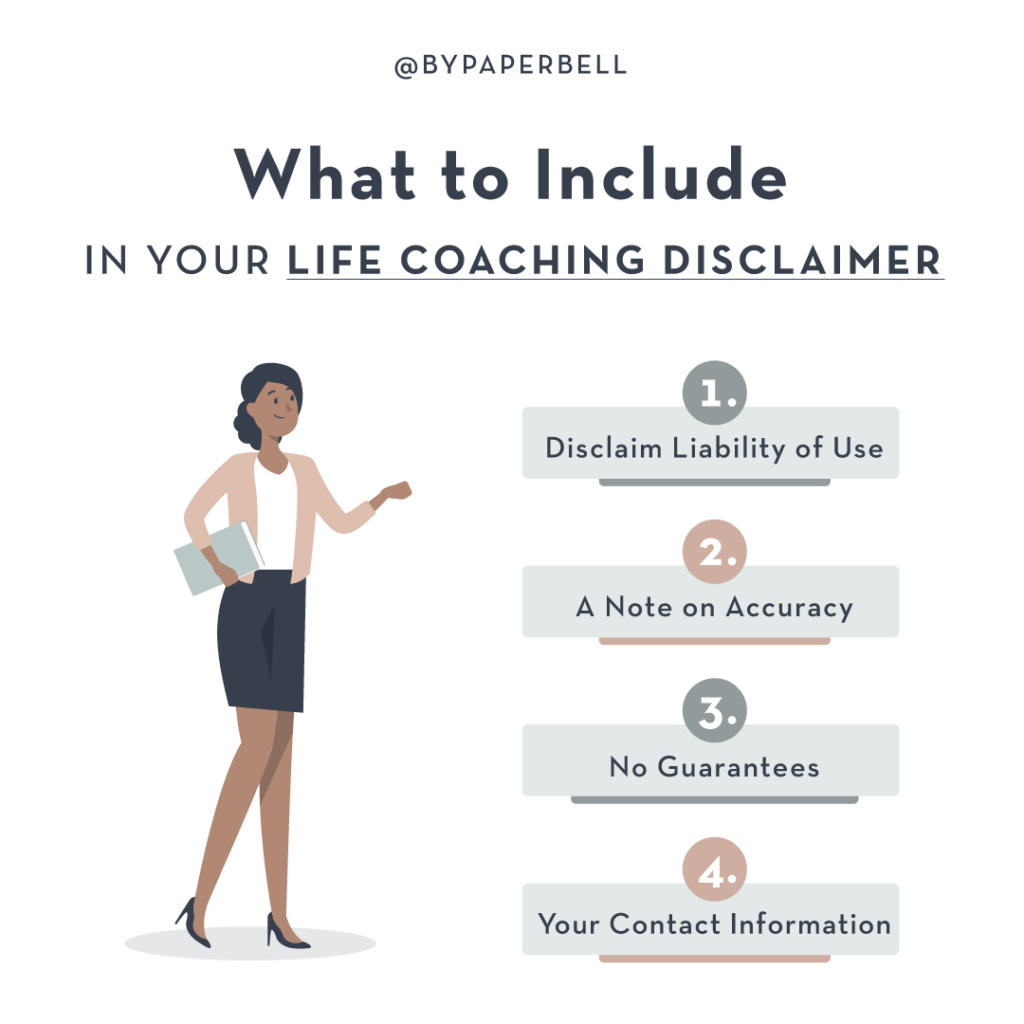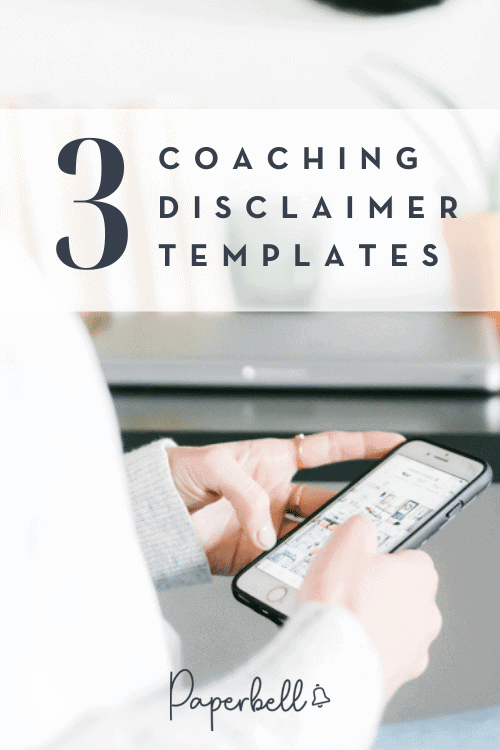As coaches, we work with people to help them go through life transitions, build awareness of themselves, and get to where they want to be. We do our best to hold space for our clients and guide them with the knowledge and perspective we have.
However, when you’re sharing content or advice online related to coaching, you don’t know who’s the receiver. You don’t know their story and what they might be dealing with.
The people who read your website or app, blog, freebies, and handouts are typically not your clients (yet), so you’re not there to facilitate their transformation after reading your materials.
That’s when a legal disclaimer becomes key, protecting your client (as well as yourself) and letting them know how your advice is meant to be used. Let’s dive into how they are made and break down three coaching disclaimer templates you can use on all your platforms and materials.
So Why Do You Need a Coaching Disclaimer?
Imagine you’re giving general advice on healthy nutrition or exercise to someone who’s been dealing with chronic health issues their whole life. Even though the strategies you share with the best intentions can be miraculous to a healthy person, they could worsen this person’s issues.
This is why it’s important to share a disclaimer where you let them know that you’re not a medical expert and that they should apply the tools you offer at their own risk. This doesn’t make you a bad coach or make your clients lose your trust — quite the opposite! It just makes you a professional who looks out for the people you serve. People with special needs will simply know that they need to turn to a medical, legal, etc., expert to have their problems solved.
And since we’re talking about disclaimers, here’s something to note for you.
The information we gathered in this article should not be considered legal advice. We are coaches who’ve been in the trenches, but we’re not lawyers. If you need personalized guidance, please seek legal advice from a lawyer.
See what we did there? We gave you a heads-up so you’ll know what to expect in this free guide — no surprises. Placing a disclaimer on your coaching guides or even your contract will protect you from any legal troubles in the future.
[ Read: How To Create A Legally Binding Coaching Contract From Scratch ]
So, let’s look at how it’s done.
5 Legal Disclaimer Types for Coaches

1. Legal and Medical Disclaimer
Getting clear on your background gives your audience perspective on what you’re qualified to share advice on. We’re not talking about a coaching certification here. That’s completely optional. A certified coach can be just as equipped to help their clients as someone who has never had formal coaching training but brings other experiences to the table.
[ Read: Do You Have To Be Licensed To Be A Life Coach? ]
We’re primarily talking about the fields that require a license to be practiced, such as therapy, medicine, and law. These fields might be closely related to the area you’re coaching your clients on.
If you’re a health and well-being coach, tell them you’re not a medical advisor. If you’re coaching someone on their business structure and client agreements, let them know you’re not a legal professional.
If you happen to be licensed in one of these fields, you should still give a heads-up that you may be a lawyer, but you’re not their lawyer. Therefore, they should not take the information in your materials as legal advice.
2. Liability or Responsibility Disclaimer
To disclaim liability means that you’re not taking responsibility for what happens if people try the strategies you offer on your pages or materials.
So, if they try your recipe, the supplement you endorse, or the workout you recommend, you won’t be liable for any health concerns your audience might face.
They should be practicing your methods at their own risk and consult with their doctors about how compatible these regimens are with their present health concerns.
3. Guarantee or Past Performance Disclaimer
We’re all different; methods related to mental health and well-being may bring different results for everyone. Even medically approved treatments that work for the average person might have exceptions, so how could we guarantee that the life coaching methods will change someone’s life when we don’t even know them personally?
A no-guarantee disclaimer should be included in all your coaching contracts. It’s also a good practice to have it on your freebies and non-client materials.
Some coaches also use past performance disclaimers that state that the previous performance of the methods shared does not guarantee future results.
4. Accuracy Disclaimer
When you create a presentation or write content, you do your best to provide accurate information. However, it might become out-of-date at some point.
Once your materials are sent or handed out, you won’t be able to update this information for them. This disclaimer informs readers that in case regulations or the latest research changes on some of the facts shared by you, they won’t necessarily reflect what’s accurate today.
If you’re sharing content online, you can also forego any misunderstanding by simply stating when your content was last edited.
5. Confidentiality Disclaimer
Confidentiality disclaimers should always be a part of your coaching agreements. They should state that all information discussed in your sessions stays between you and the client.
It’s also worth mentioning that any personal information about the client, including your session notes, will solely be used to keep in touch and efficiently conduct your coaching calls; they won’t be shared with a third party.
3 Ready-Made Coaching Disclaimer Templates
Here are three sample disclaimers you can use in your website content, agreements, and coaching materials.
1. Disclaimer Examples for Health and Well-being Coaches
If you share information on health, well-being, nutrition, fitness, and so on, you should share a health disclaimer. The first part of this statement outlines your qualifications.
I am not a medical professional. As a [health/fitness/well-being] coach, I am not providing healthcare, medical, or nutritional therapy services or attempting to diagnose, treat, prevent, or cure any physical, mental, or emotional issues.
Next, you’ll clarify that what you offer isn’t medical advice.
The information provided on [this website/material] is for informational purposes only and is not intended to substitute professional medical advice, diagnoses, or treatment. Always seek advice from your physician or other qualified healthcare provider before undertaking a new health regimen.
Last but not least, you’ll make sure that the health tips you offer don’t interfere with any current medical treatment.
Do not disregard medical advice or delay seeking one because of information you read [in/on this material/website]. Do not start or stop any medications without speaking to your medical or mental health provider first.
If you are working in the medical field or as a licensed therapist, you might want to let your clients know that you’re not their doctor or therapist. Therefore, you’re not taking responsibility for finding a cure for their condition, as you would in the case of a patient of yours.
Although I am a [nurse/dietitian/therapist/etc.] I am not YOUR [nurse/dietitian/therapist/etc.]. All information [on/during this website/training/etc.] is for informational purposes only, does not constitute medical advice, and does not establish any kind of patient-client relationship. If you require immediate assistance or have questions regarding your health, contacting a healthcare call center can provide timely support and guidance.
2. Sample Disclaimer Template for Life Coaches
Coaching is often mistaken for therapy or other types of mental health treatments. As a life coach, you’re almost certainly going to touch upon areas related to emotional and mental well-being, so it’s important to clarify that you’re not providing therapy.
I am not a licensed psychologist or specialist healthcare professional. My services do not replace the care of psychologists or other healthcare professionals.
To disclaim your liability of use, i.e., not take responsibility for how your advice is used, you can use this disclaimer statement.
Please note that I can’t take any responsibility for the results of your actions and any harm or damage you suffer as a result of the use, or non-use of the information available [on this website/material]. Please use your discernment and conduct due diligence before taking any action or implementing any plan or practice suggested or recommended [on this website/material].
We’ve also talked about making no guarantees previously. This disclaimer states that you shouldn’t be held liable for the results your methods generate.
Please note that I don’t make any guarantees about the results of the information applied [on this website/material]. I share educational and informational resources that are intended to help you succeed in [coaching area]. You nevertheless need to know that your ultimate success or failure will be the result of your own efforts, your particular situation, and innumerable other circumstances beyond my knowledge and control.
3. Disclaimer Template for Business Coaches
As a business coach, you might touch upon areas that have legal and financial regulations, such as setting up a business, managing taxation, legal compliance, and so on. This disclaimer clarifies that what you offer isn’t legal or investment advice.
I am not a lawyer or certified public accountant, and this should not be considered legal or financial advice. You should seek appropriate counsel for your own situation.
Regulations around business and entrepreneurship may also differ in each country or state. Highlight the fact that you’re someone with experience in a certain region and not others.
Please note, this information is directed towards readers of [the United States/United Kingdom/Australia/etc.] If you are conducting business outside of [the United States/United Kingdom/Australia/etc.], please seek information and professional advice regarding your local regulations.
Where Should I Display My Coaching Disclaimer?
To put it simply, anywhere where you share information or advice as a coach. This could be your:
- Website footer or disclaimer page,
- Blog,
- Printed handouts,
- Downloadable PDFs,
- In-person training, or
- Online courses.
It’s best to include them in your client contracts and your terms and conditions or website disclaimer as well. If you need a cheat sheet to set up your website and packages, you can try our free coaching template pack
Implement these coaching disclaimer statements anywhere where you feel additional context is important in your communication. They will remind your clients to look after themselves and provide legal protection for your business.
For an easy way to manage all your disclaimers, you can try Paperbell. It’s an all-in-one client management platform that handles all your client information, coaching materials, contracts, and landing pages on one simple platform.
Try Paperbell with your first client for free.

Editor’s Note: This post was originally published in September 2021 and has since been updated for accuracy./









